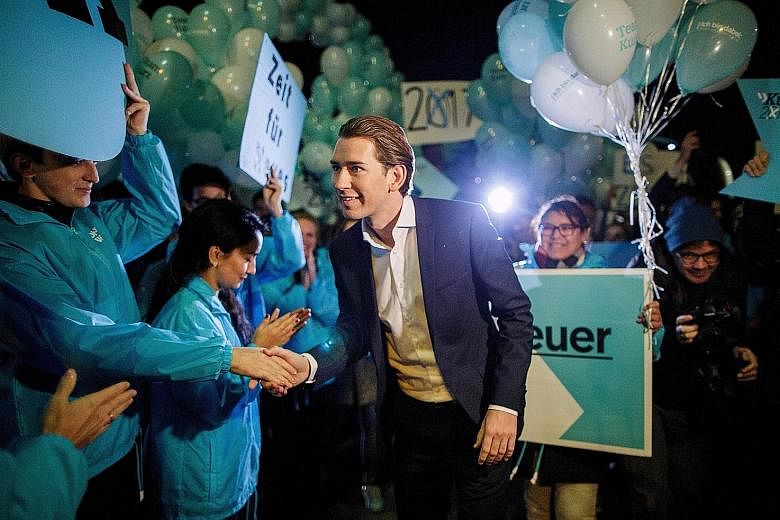Austria is set to make history today by electing Europe's youngest head of government. At only 31, Mr Sebastian Kurz has already achieved the considerable feat of rescuing his centre-right Austrian People's Party from the electoral doldrums and into the leading position in the polls; he is almost certain to become Austria's chancellor after the ballots close tonight.
Yet, Austria's apparent tribute to modernity is overshadowed by an electoral campaign which was dominated by themes harking back to Europe's darkest past, with candidates denying charges of anti-Semitism, while at the same time vying with each other in pledges to restrict the rights of immigrants in general, and Muslims in particular.
So, while a young generation of politicians takes charge in Austria, old fears of foreigners have never been stronger.
With his boyish good looks, sharply-tailored suits and slick gelled hair, Mr Kurz is a poster child for modern Austria. His talents are undoubted: he became Austria's foreign minister at the age of 27 and, within months, gained the admiration of his much older European colleagues, although most of them could not contain their laughter when Mr Kurz opened a speech to the United Nations General Assembly in New York with: "Ladies and gentlemen, the world has never felt more insecure, at least not in my lifetime.
On the campaign trail, Mr Kurz told correspondents he "definitely never wanted to become a career politician", pretending that his meteoric promotion to the top of his country's public life came just by accident. In fact, politics is in his blood, and his main achievement is to take over the People's Party, which has governed Austria for 44 years since the end of the World War II, and transform it into a modern political movement committed to implementing radical changes to the same political system it itself created.
Mr Kurz achieved this about-face by effectively copying the policies of the far-right Freedom Party (or FPO, as it is known by its German-language acronym), an anti-immigration and anti-Islamic movement which until recently looked poised to emerge as Austria's strongest party.
Like the FPO, Mr Kurz adopted a pledge to "eliminate" the migration routes from Africa and the Middle East, and fight the alleged "Islamisation" of Austria, a country of 8.7 million people, out of which 15 per cent are immigrants but only 7 per cent belong to the Muslim faith.

Like the FPO, Mr Kurz also equated Islam with violence, and promised to crack down on what he termed as "extremism".
At times, Mr Kurz's anti-Islam message was actually harsher than that of the FPO. He claimed, for instance, that "one-third" of mosques in the Austrian capital of Vienna are engaged in activities which supposedly undermine national laws, on the basis of dodgy statistics subsequently proven to have been unprofessionally collected. And he repeatedly asserted that Muslim migrants are both unwilling and often incapable of integrating into Austrian society.
The electoral campaign was so dominated by anti-Islam messages that Mr Peter Filzmaier, one of Austria's most prominent political pundits, recently remarked that if Mr Kurz were to be asked on the campaign trail what he proposed to do about Austria's road traffic difficulties, he would no doubt have answered that veil-wearing Islamic women "double-parked in front of Islamic kindergartens are to blame for Austria's traffic problems".
In order to deflect charges of racism, Mr Kurz challenged the far-right FPO to publicly disown that party's historic links with anti-Semitism. But in a surprising twist in the campaign, some officials close to the centre-left Socialists who now control Austria's government were discovered to have posted on websites their own anti-Semitic slurs, accusing Mr Kurz of being "in the pay" of rich Jewish benefactors.
For all intents and purposes, the Austrian electoral campaign has consisted of every party both accusing and standing accused of racism. It has been, by all accounts, one of the ugliest campaigns in modern Austrian history.
Mr Kurz's strategy of stealing the clothes of his far-right challengers appears to have succeeded; the populist FPO's lead was eroded in opinion polls and it looks set to get not more than a quarter of the ballots, while Mr Kurz's party may attract as much as a third of the votes, and the ruling Socialists could be pushed into third place.
But victory will come at a high cost. For chancellor Kurz - as he will soon become - will then have to settle down to creating a coalition with the same FPO far-righters he is now deriding.
And he will have to reassure Austria's migrant population as well as the country's European partners that he can pull back from the anti-Islamic inflammatory statements he was so fond of making on the campaign trail.


